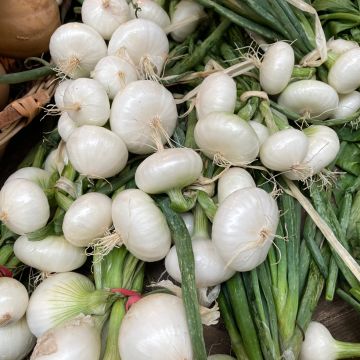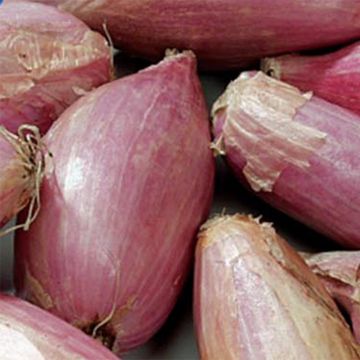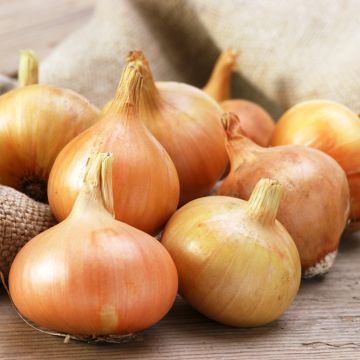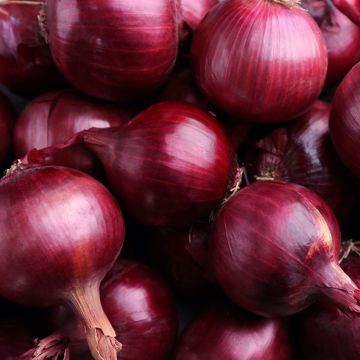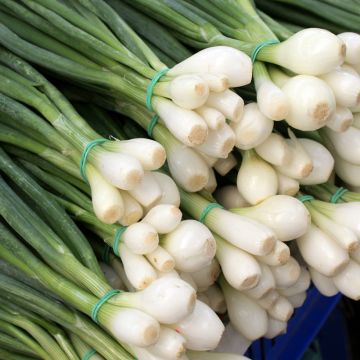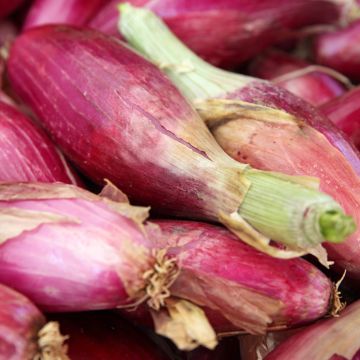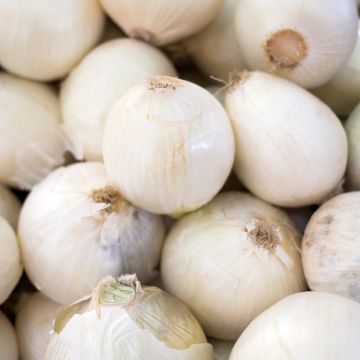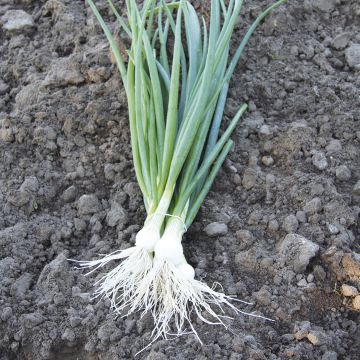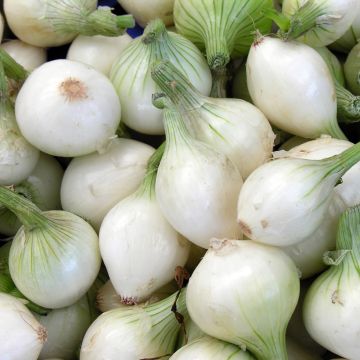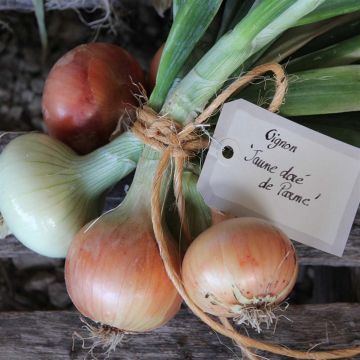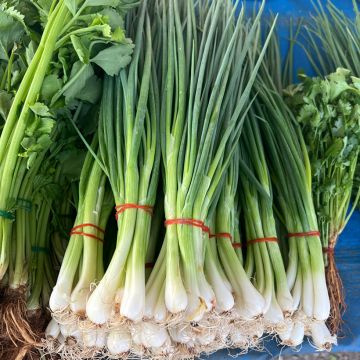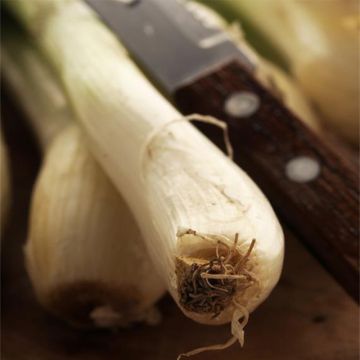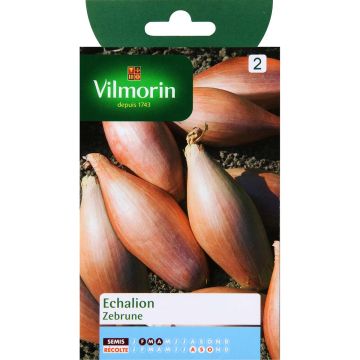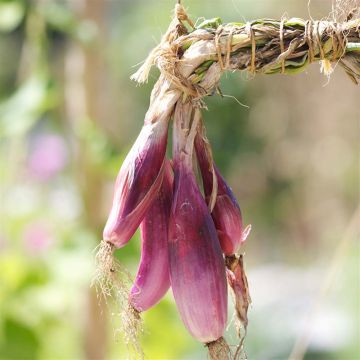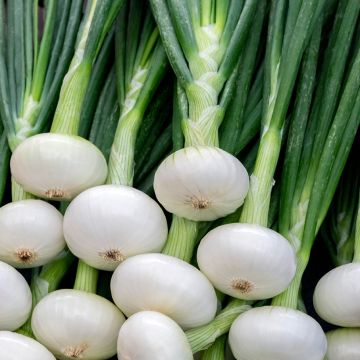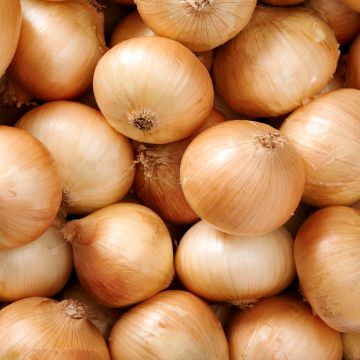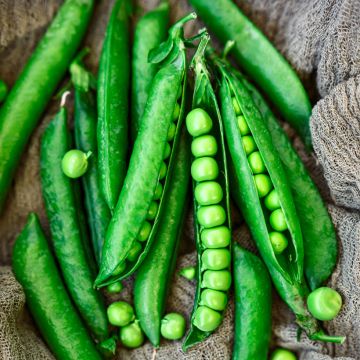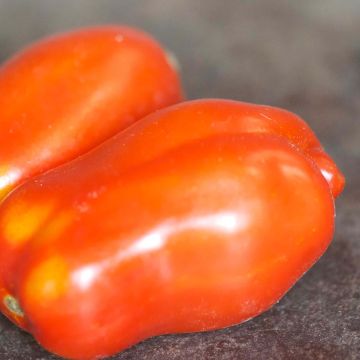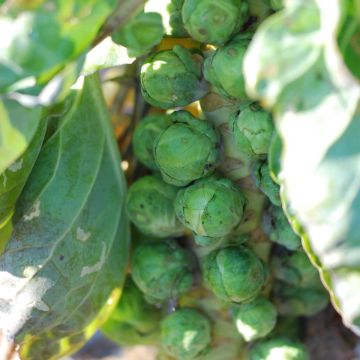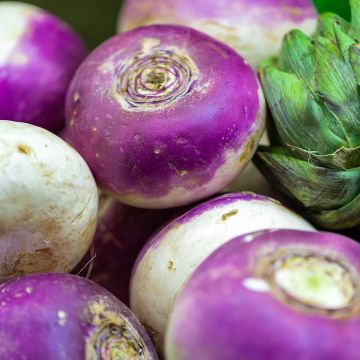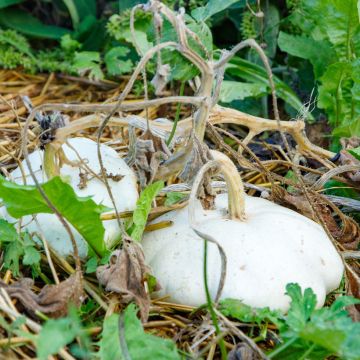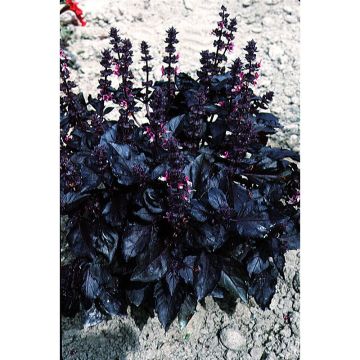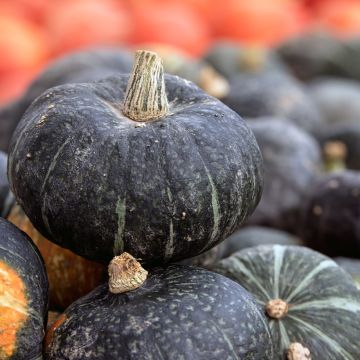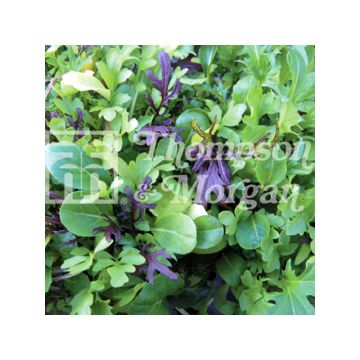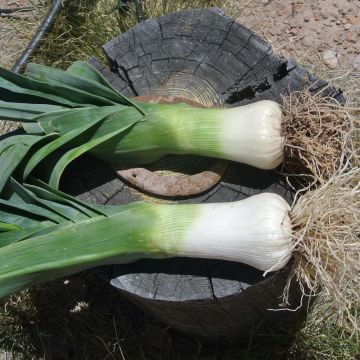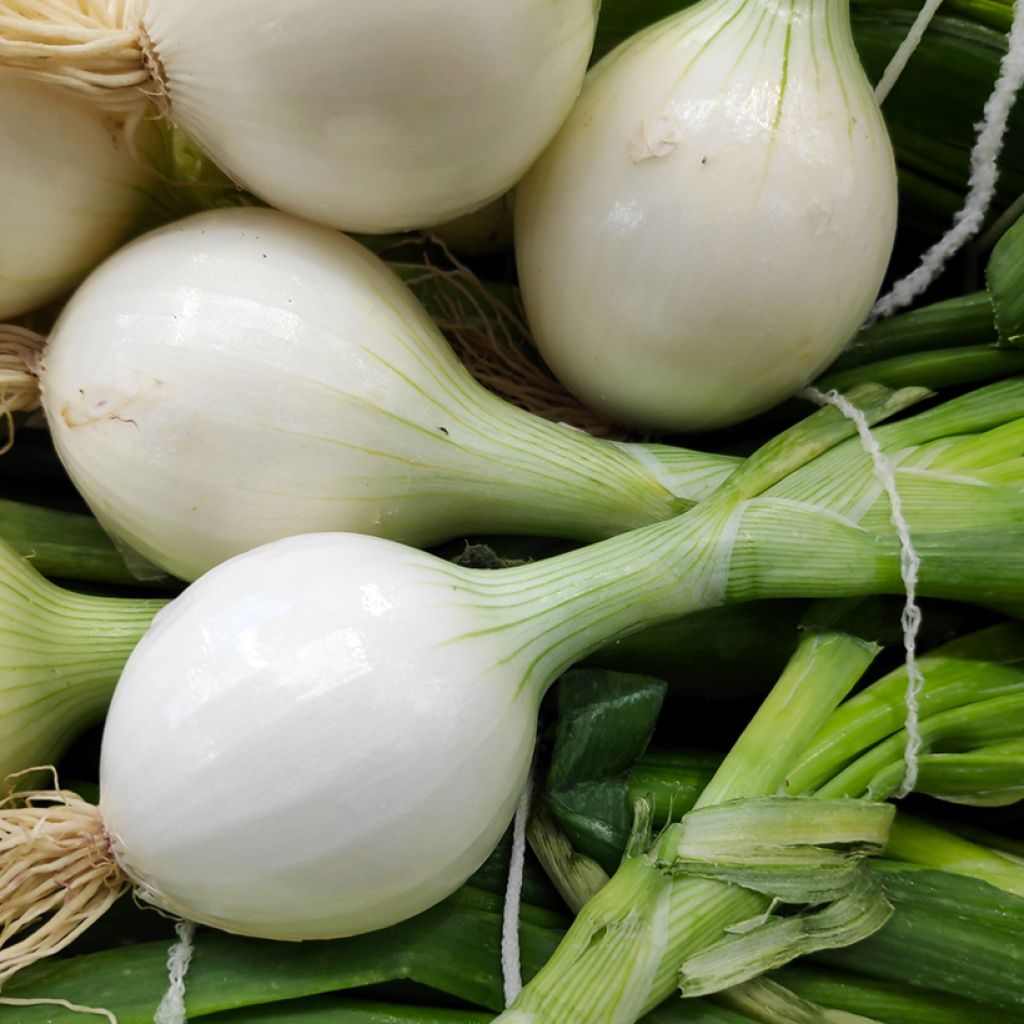

White Onion Très Hâtif de la Reine
White Onion Très Hâtif de la Reine
Allium cepa Blanc très hâtif de la Reine
White Onion
Why not try an alternative variety in stock?
View all →This plant carries a 6 months recovery warranty
More information
We guarantee the quality of our plants for a full growing cycle, and will replace at our expense any plant that fails to recover under normal climatic and planting conditions.
Seed-only orders are dispatched by sealed envelope. The delivery charge for seed-only orders is €3.90.
Description
'Très Hâtif de la Reine' onion is a very early variety that forms large, flattened globe-shaped bulbs with ivory white flesh. Its flavour is mild and sweet, perfect for pickling and chutney. It is best harvested young and eaten quickly as it doesn’t store well. Unfortunately, it is not very cold hardy and is better suited to regions with milder winters. Sow from February to April or from August to September. Harvest from May to July.
The onion (Allium cepa) is a popular herbaceous biennial vegetable (grown as an annual) belonging to the Fabaceae family alongside chives, garlic and leeks. It is grown for its edible bulb and occasionally for its stalks. It is thought to be native to central Asia, where it has been consumed for over 6000 years. Traces of onions have also been found in Ancient Egyptian tombs. They were introduced to Western Europe much later by the Romans, then to the Americas during Christopher Columbus’s second voyage.
Bulb onions can be grouped into 3 main categories, based on the colour of their bulb:
- Yellow onions: sweet flavoured, generally the best type for storing and cooking
- White onions: fairly mild-flavoured, perfect for eating raw
- Red onions: sharp yet sweet flavour and bright colour, delicious grilled, in salads or in sandwiches
Spring onions are regular bulb onions (often white) that are harvested early, when the bulbs are still immature. If they are harvested prior to bulbing, they will often be referred to as green onions. Scallions are cultivars selected to produce a long, slender white shank rather than a bulb. Bunching onions or Japanese onions are a different species altogether (Allium fistulosum). All are fairly similar in flavour and can be substituted in recipes if need be.
Onions are an excellent source of minerals and vitamins A, B and C. They are known for their ability to reduce “bad” cholesterol and lower blood pressure. They develop a sweeter flavour and are easier to digest when cooked. To avoid eye irritation when preparing onions, peel or chop them under the tap or in a bowl of water.
Harvesting: Harvest spring onions… in the spring, when the leaves are still green. Mature bulb onions are harvested in the summer when the onions tops are completely dried out and folded over. Gently lift the bulbs, brush off any excess soil and leave them to dry in the sun for 2-3 days.
Storage: Onions will keep for several months in the right conditions. Cut off the leaves and store the onions in a dark, cool, dry and airy place. If the leaves are strong/long enough, they can be braided together to form attractive bunches and hung from the ceiling. Before storing, check for bruising as it only takes one rotten bulb to contaminate the whole crop.
Good to know: onions and carrots are excellent companion plants as onions repel carrot fly. Onions can also be successfully grown alongside beets, strawberries and lettuce. Avoid growing onions too close to members of the Fabaceae family.
Report an error about the product description
Harvest
Plant habit
Foliage
Botanical data
Allium
cepa
Blanc très hâtif de la Reine
Alliaceae
White Onion
Central Asia
Biennial
Other Onion seeds
Planting and care
Soil preparation:
Onions will grow in most types of soil, preferably light and well-drained. Onions are very sensitive to excess nitrogen: avoid growing onions on a recently fertilized plot, after green manures or vegetables from the Fabaceae family (beans, peas, broad beans). Make sure to wait about 5 years before returning onions to the same plot.
Spring sowing: Coloured onions (yellow and red) and some early white varieties are direct sown from February to April (or in the autumn in milder climates). Lightly sow in furrows, about 2 cm deep, with 20 cm between each row. Gently cover with soil and water. Germination takes about 18 days. When the seedlings are approximately 5 cm tall (about 2 months after sowing), they need to be thinned out. Keep one plant every 10 cm on average. Harvest during the summer months.
Autumn sowing: White onions are sown in late summer (August-September) in seed trays or pots. Transplant one month later in milder climates, or in late winter elsewhere (February). Allow 20 cm between rows and 10 cm between each plant. White onions are then harvested in the spring.
Care: Hoe regularly, especially at the beginning. Avoid mulching as this can cause the bulbs to rot. Onions are sensitive to excessive humidity: watering should be kept to a minimum, mainly during sowing and transplanting.
Seedlings
Care
Intended location
This item has not been reviewed yet - be the first to leave a review about it.
Vegetable seeds
Haven't found what you were looking for?
Hardiness is the lowest winter temperature a plant can endure without suffering serious damage or even dying. However, hardiness is affected by location (a sheltered area, such as a patio), protection (winter cover) and soil type (hardiness is improved by well-drained soil).

Photo Sharing Terms & Conditions
In order to encourage gardeners to interact and share their experiences, Promesse de fleurs offers various media enabling content to be uploaded onto its Site - in particular via the ‘Photo sharing’ module.
The User agrees to refrain from:
- Posting any content that is illegal, prejudicial, insulting, racist, inciteful to hatred, revisionist, contrary to public decency, that infringes on privacy or on the privacy rights of third parties, in particular the publicity rights of persons and goods, intellectual property rights, or the right to privacy.
- Submitting content on behalf of a third party;
- Impersonate the identity of a third party and/or publish any personal information about a third party;
In general, the User undertakes to refrain from any unethical behaviour.
All Content (in particular text, comments, files, images, photos, videos, creative works, etc.), which may be subject to property or intellectual property rights, image or other private rights, shall remain the property of the User, subject to the limited rights granted by the terms of the licence granted by Promesse de fleurs as stated below. Users are at liberty to publish or not to publish such Content on the Site, notably via the ‘Photo Sharing’ facility, and accept that this Content shall be made public and freely accessible, notably on the Internet.
Users further acknowledge, undertake to have ,and guarantee that they hold all necessary rights and permissions to publish such material on the Site, in particular with regard to the legislation in force pertaining to any privacy, property, intellectual property, image, or contractual rights, or rights of any other nature. By publishing such Content on the Site, Users acknowledge accepting full liability as publishers of the Content within the meaning of the law, and grant Promesse de fleurs, free of charge, an inclusive, worldwide licence for the said Content for the entire duration of its publication, including all reproduction, representation, up/downloading, displaying, performing, transmission, and storage rights.
Users also grant permission for their name to be linked to the Content and accept that this link may not always be made available.
By engaging in posting material, Users consent to their Content becoming automatically accessible on the Internet, in particular on other sites and/or blogs and/or web pages of the Promesse de fleurs site, including in particular social pages and the Promesse de fleurs catalogue.
Users may secure the removal of entrusted content free of charge by issuing a simple request via our contact form.
The flowering period indicated on our website applies to countries and regions located in USDA zone 8 (France, the United Kingdom, Ireland, the Netherlands, etc.)
It will vary according to where you live:
- In zones 9 to 10 (Italy, Spain, Greece, etc.), flowering will occur about 2 to 4 weeks earlier.
- In zones 6 to 7 (Germany, Poland, Slovenia, and lower mountainous regions), flowering will be delayed by 2 to 3 weeks.
- In zone 5 (Central Europe, Scandinavia), blooming will be delayed by 3 to 5 weeks.
In temperate climates, pruning of spring-flowering shrubs (forsythia, spireas, etc.) should be done just after flowering.
Pruning of summer-flowering shrubs (Indian Lilac, Perovskia, etc.) can be done in winter or spring.
In cold regions as well as with frost-sensitive plants, avoid pruning too early when severe frosts may still occur.
The planting period indicated on our website applies to countries and regions located in USDA zone 8 (France, United Kingdom, Ireland, Netherlands).
It will vary according to where you live:
- In Mediterranean zones (Marseille, Madrid, Milan, etc.), autumn and winter are the best planting periods.
- In continental zones (Strasbourg, Munich, Vienna, etc.), delay planting by 2 to 3 weeks in spring and bring it forward by 2 to 4 weeks in autumn.
- In mountainous regions (the Alps, Pyrenees, Carpathians, etc.), it is best to plant in late spring (May-June) or late summer (August-September).
The harvesting period indicated on our website applies to countries and regions in USDA zone 8 (France, England, Ireland, the Netherlands).
In colder areas (Scandinavia, Poland, Austria...) fruit and vegetable harvests are likely to be delayed by 3-4 weeks.
In warmer areas (Italy, Spain, Greece, etc.), harvesting will probably take place earlier, depending on weather conditions.
The sowing periods indicated on our website apply to countries and regions within USDA Zone 8 (France, UK, Ireland, Netherlands).
In colder areas (Scandinavia, Poland, Austria...), delay any outdoor sowing by 3-4 weeks, or sow under glass.
In warmer climes (Italy, Spain, Greece, etc.), bring outdoor sowing forward by a few weeks.

































